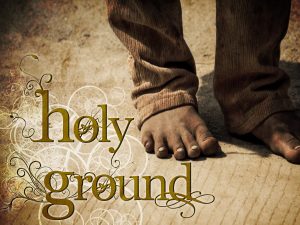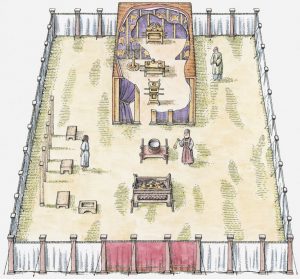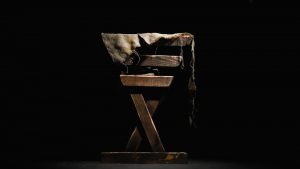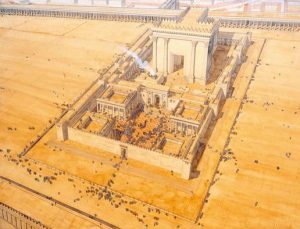
Shownotes
Wisdom-Trek / Creating a Legacy
Welcome to Day 1301 of our Wisdom-Trek, and thank you for joining me.
I am Guthrie Chamberlain, Your Guide to Wisdom
Mastering the Bible – Holy Ground and Sacrifices – Worldview Wednesday

Wisdom - the final frontier to true knowledge. Welcome to Wisdom-Trek! Where our mission is to create a legacy of wisdom, to seek out discernment and insights, to boldly grow where few have chosen to grow before. Hello, my friend, I am Guthrie Chamberlain, your captain on our journey to increase Wisdom and Create a Living Legacy. Thank you for joining us today as we explore wisdom on our 2nd millennium of podcasts. This is Day 1301 of our Trek, and it is Worldview Wednesday. Creating a Biblical Worldview is important to have a proper perspective on today’s current events. To establish a Biblical Worldview, it is required that you also have a proper understanding of God and His Word. Our focus for the next several months on Worldview Wednesday is Mastering the Bible, through a series of brief insights. These insights are extracted from a book of the same title from one of today’s most prominent Hebrew Scholars, Dr. Micheal S. Heiser. This book is a collection of insights designed to help you understand the Bible better. When we let the Bible be what it is, we can understand it as the original readers did, and as its writers intended. Each week we will explore two insights.
Mastering The Bible – Holy Ground and Sacrifices
Insight Twenty-Nine: Biblical Writers Took the Concept of Holy Ground Seriously.
 To the ancient Israelite, the world was a perilous place. Not only did most people live a subsistence lifestyle, where daily bread was a literal concern, but they were surrounded by hostile supernatural forces. God’s choice of Israel was a blessing, but it came on the heels of the terrible judgment at the Tower of Babel, where all the other nations were allotted to the dominion of lesser gods as we looked at in Deuteronomy 32:8-9 in a previous week. At that point it Israel was alone against the world.
To the ancient Israelite, the world was a perilous place. Not only did most people live a subsistence lifestyle, where daily bread was a literal concern, but they were surrounded by hostile supernatural forces. God’s choice of Israel was a blessing, but it came on the heels of the terrible judgment at the Tower of Babel, where all the other nations were allotted to the dominion of lesser gods as we looked at in Deuteronomy 32:8-9 in a previous week. At that point it Israel was alone against the world.
This worldview operated in tandem with an idea fundamental to biblical theology: the holiness of God. Last week we discussed how if something was set aside for God was considered holy; therefore, the things associated with him were holy or had to be made holy. Wherever the presence of God was to be found, that place was by definition holy ground. The most obvious example is the territory encompassed by the tabernacle and, later, the temple. Only priests—people who had been made holy that is, set apart or “sanctified” by ritual acts, were allowed on that holy ground.
The concept was actually broader. While the Israelites journeyed to the promised land, “holy ground” was also equated with the entire camp of Israel since the ark located within the Holy of Holies was at the center of the camp (Numbers 2—3). This is why, in the Day of Atonement ceremony, the goat that bore the sins of the nation was driven out of the camp (Leviticus 16). Sin has no place on holy ground.
Once the Israelites settled in the promised land—God’s domain—the entire land was considered holy ground. Everywhere outside Israel was unholy.
Some odd episodes in the Old Testament are understandable in light of this worldview. In 2 Kings 5, we read the story of Naaman, the Syrian captain who had leprosy. Once miraculously healed. Naaman asked the prophet, Elisha, if he could load his mule with dirt to take home with him. The request seems ridiculous, but isn’t. Naaman recognized that Yahweh of Israel was the true God, so Naaman wanted to take some holy ground back with him to Syria, which was ruled by another god, Rimmon. This is found in 2 Kings 5:15-18, Then Naaman and his entire party went back to find the man of God. They stood before him, and Naaman said, “Now I know that there is no God in all the world except in Israel. So please accept a gift from your servant.” But Elisha replied, “As surely as the Lord lives, whom I serve, I will not accept any gifts.” And though Naaman urged him to take the gift, Elisha refused. Then Naaman said, “All right, but please allow me to load two of my mules with earth from this place, and I will take it back home with me. From now on, I will never again offer burnt offerings or sacrifices to any other god except the Lord. However, may the Lord pardon me in this one thing: When my master the king goes into the temple of the god Rimmon to worship there and leans on my arm, may the Lord pardon me when I bow, too.” Similarly, when David was driven out of Israelite territory, he complains that he had been told to go worship other gods (1 Samuel 26:17-20). We might wonder why David would care. Didn’t he realize he could worship God everywhere? He actually didn’t. The tabernacle and the priesthood were in Israel—holy ground. He was not.
Similarly, when David was driven out of Israelite territory, he complains that he had been told to go worship other gods (1 Samuel 26:17-20). We might wonder why David would care. Didn’t he realize he could worship God everywhere? He actually didn’t. The tabernacle and the priesthood were in Israel—holy ground. He was not.
This conceptual framework is significant for New Testament theology. The presence of God no longer lives in the temple or any one place. Instead, the Presence dwells in each believer (Ephesians 2:22; 3:17; James 4:5). We are the temple of God, individually and corporately (1 Corinthians. 3:16; 6:19). We are holy ground, and we ought to take the concept as seriously as biblical people did.
Insight Thirty: Old Testament Sacrifices Weren’t Primarily About Individual Forgiveness for Sin
 The sacrificial system of the Old Testament isn’t easy to understand. Not only is the system convoluted and complex, but statements about its purpose seem to contradict each other. On the one hand, Hebrews 10:4 asserts, “For it is not possible for the blood of bulls and goats to take away sins.” On the other hand, one of the results of various sacrifices in the book of Leviticus is that the person (or nation) will “be forgiven” (e.g., Leviticus 4:20 &26; 5:10).
The sacrificial system of the Old Testament isn’t easy to understand. Not only is the system convoluted and complex, but statements about its purpose seem to contradict each other. On the one hand, Hebrews 10:4 asserts, “For it is not possible for the blood of bulls and goats to take away sins.” On the other hand, one of the results of various sacrifices in the book of Leviticus is that the person (or nation) will “be forgiven” (e.g., Leviticus 4:20 &26; 5:10).
The problem of this apparent inconsistency is a matter of both terminology and taking a more careful look at Old Testament sacrifices. There are indeed certain passages where sacrifices do indeed result in “being forgiven,” but exactly what that means requires explanation. Most of the time, however, blood sacrifice has nothing to do with addressing individual sin.
The burnt, grain, and peace offerings (Leviticus 1-3) were basically gifts to God. They were positive responses to the fellowship relationship between the one bringing the offering and the Lord. They were offered to enhance the well-being of that relationship, not to earn salvation. The so-called “sin offering” (Leviticus 4-5) and “guilt offering” (Leviticus 5-7) are less comprehensible to us. Part of the problem is that the translated English names of these offerings are misleading. They are better understood as “the purification offering” and “the reparation offering.” The blood of these offerings was never applied to the one bringing the offering, so there is no sense that the worshipper was being cleansed of sin. The blood was only used to purify the sanctuary and its furniture. These offerings were designed to purge the sanctuary and its accouterments from ritual defilement to maintain the sanctity of sacred space.
It is crucial to grasp the biblical meaning of Hebrew terms translated “atone or take away” (kipper) and “forgive" (salacli). Contrary to popular teaching, the first term does not mean “to cover.” Rather, kipper means “to purge” or “wipe clean” with respect to the defilement of the sanctuary. This makes sense, given the use of the blood in the offerings noted above. The second term is best translated “become clean” or “be purified.” This again makes sense since the blood was applied to the sanctuary. This helps us understand passages that speak of a person being forgiven. These blood sacrifices purged and purified the sanctuary from defilement that could be brought to it by people who either committed a moral offense (i.e., sinned) or who “inadvertently” (as opposed to defiantly) became unclean and were no longer holy (Leviticus 4:2, 22; 5:15). People were “forgiven” in the sense that they would no longer bring contamination into sacred space. There was no sacrifice at all in the Old Testament for defiant sin (e.g., Numbers 15:30-31).
The blood sacrifices therefore meant that the one making the offering no longer threatened sacred space. While the contaminating effect of inadvertent sin was dealt with, sacrifices didn’t offer the same permanent forgiveness and removal of sin as Jesus does.
That will conclude this week’s lesson on another two insights from Dr. Heiser’s book “Mastering The Bible.” Next Worldview Wednesday, we will continue with two additional insights. I believe you will find each Worldview Wednesday an interesting topic to consider as we build our Biblical worldview.
Tomorrow we will continue with our 3-minute Humor nugget that will provide you with a bit of cheer, which will help you to lighten up and live a rich and satisfying life. So encourage your friends and family to join us and then come along with us tomorrow for another day of ‘Wisdom-Trek, Creating a Legacy.' If you would like to listen to any of our past 1300 treks or read the Wisdom Journal, they are available at Wisdom-Trek.com. I encourage you to subscribe to Wisdom-Trek on your favorite podcast player so that each day’s trek will be downloaded automatically.
If you would like to listen to any of our past 1300 treks or read the Wisdom Journal, they are available at Wisdom-Trek.com. I encourage you to subscribe to Wisdom-Trek on your favorite podcast player so that each day’s trek will be downloaded automatically.
Thank you so much for allowing me to be your guide, mentor, and, most of all, your friend as I serve you in through this Wisdom-Trek podcast and journal.
As we take this Trek together, let us always:
- Live Abundantly (Fully)
- Love Unconditionally
- Listen Intentionally
- Learn Continuously
- Lend to others Generously
- Lead with Integrity
- Leave a Living Legacy Each Day
I am Guthrie Chamberlain….reminding you to ’Keep Moving Forward,’ ‘Enjoy your Journey,' and ‘Create a Great Day…Everyday’! See you Tomorrow!